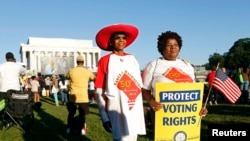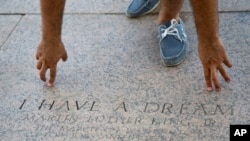Tens of thousands of people gathered in Washington Saturday to remember the Reverend Martin Luther King Jr's landmark "I Have a Dream" civil-rights speech half a century ago.
In 1963 African-Americans were struggling to overcome racial discrimination that restricted voting by blacks in parts of the United States, blocked their access to good jobs, and left many mired in poverty.
King's speech highlighted a march by 250,000 people, which showed the growing political clout of the non-violent movement that eventually won new laws protecting civil rights for blacks and others.
Fifty years later, U.S. Attorney General Eric Holder told a new march that civil-rights pioneers made it possible for him to be the first African American to head the Justice Department. He also said much work remains to be done to protect voting rights for blacks and fully extend civil rights to other groups like Hispanics and gays.
Veteran civil rights activist, the Reverend Jesse Jackson, said 50 years after King's speech, "We are free but not equal," and urged his listeners to keep dreaming, keep the faith, and keep hope alive.
Speaking to the same group, civil-rights leader Julian Bond complained that economic indicators show blacks still lag far behind whites. He denounced a recent U.S. Supreme Court decision that he said damaged the voting rights that "we fought and died for."
Wednesday is the actual anniversary of the speech (August 28). It will be marked by speeches from U.S. President Barack Obama, the country's first African-American president, as well as former presidents Jimmy Carter and Bill Clinton.
The civil-rights movement attracted attention in the mid-1950s when King, a young black preacher, led a successful effort to desegregate public buses in Montgomery, Alabama.
King won the Nobel Peace Prize in 1964 and was assassinated in 1968 in Memphis, Tennessee.
In 1963 African-Americans were struggling to overcome racial discrimination that restricted voting by blacks in parts of the United States, blocked their access to good jobs, and left many mired in poverty.
King's speech highlighted a march by 250,000 people, which showed the growing political clout of the non-violent movement that eventually won new laws protecting civil rights for blacks and others.
Fifty years later, U.S. Attorney General Eric Holder told a new march that civil-rights pioneers made it possible for him to be the first African American to head the Justice Department. He also said much work remains to be done to protect voting rights for blacks and fully extend civil rights to other groups like Hispanics and gays.
Veteran civil rights activist, the Reverend Jesse Jackson, said 50 years after King's speech, "We are free but not equal," and urged his listeners to keep dreaming, keep the faith, and keep hope alive.
Speaking to the same group, civil-rights leader Julian Bond complained that economic indicators show blacks still lag far behind whites. He denounced a recent U.S. Supreme Court decision that he said damaged the voting rights that "we fought and died for."
Wednesday is the actual anniversary of the speech (August 28). It will be marked by speeches from U.S. President Barack Obama, the country's first African-American president, as well as former presidents Jimmy Carter and Bill Clinton.
The civil-rights movement attracted attention in the mid-1950s when King, a young black preacher, led a successful effort to desegregate public buses in Montgomery, Alabama.
King won the Nobel Peace Prize in 1964 and was assassinated in 1968 in Memphis, Tennessee.






